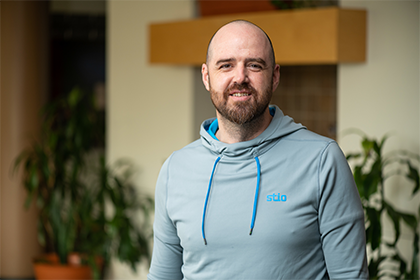UVM Cancer Center member David J. Seward, M.D., Ph.D., assistant professor of pathology and laboratory medicine, received a prestigious two-year National Cancer Institute R21 grant to investigate why lung cancers with a certain set of mutations demonstrate immunotherapy resistance.

David Seward, M.D., Ph.D., Associate Member, UVM Cancer Center
Grant will fund research on immunotherapy resistance in lung cancer
In the US, lung cancer is the leading cause of cancer-related deaths. Many advances in science have led to new and improved therapeutics, including options such as immunotherapy. Immunotherapy works to improve outcomes by promoting a patient’s immune system to find and remove cancer cells in the body.
One specific immunotherapy used in lung cancer is check-point inhibitor therapy targeting the PD-L1/PD1 interaction. PD1 is a receptor on T-cells of the immune system and is known to play a role in tumor immune evasion. With check-point inhibitor therapy, anti-PD1 monoclonal antibodies target PD1 to prevent tumor immune evasion and promote cancer cell death. While some patients respond quite efficiently to immunotherapy, a subset has little to no response. Importantly, this “non-responder” group has been characterized as having a specific set of genetic mutations, one example being oncogenic KRAS variants in combination with STK11 loss of function. Why this combination of mutations results in immunotherapy resistance remains unknown.
UVM Cancer Center member David J. Seward, M.D., Ph.D., assistant professor of pathology and laboratory medicine, received a prestigious two-year National Cancer Institute R21 grant to investigate why lung cancers with this set of mutations demonstrate immunotherapy resistance. Funded by the National Institute of Health, the team seeks to discover why certain patients exhibit resistance to anti-PD1 therapy and identify mechanisms that overcome this resistance to promote response to immunotherapy.
Working in collaboration with the labs of UVM Cancer Center members Paula Deming, Ph.D., associate professor of biomedical and health sciences, Jonathan Boyson, Ph.D., associate professor of surgery, and Ralph Budd, M.D., university distinguished professor of medicine and microbiology, the Seward Lab will use mouse models to better understand why STK11 loss of function correlates with anti-PD1 therapy resistance in patients with KRAS-driven lung cancers. The scientists hypothesize that loss of STK11 allows the tumor to fool the immune system causing the wrong immune cells to be called into action. In theory, this immune system confusion could lead to an absence of the cells targeted by anti-PD1 therapy. Once the lab has identified potential mechanisms by which STK11 mutations disrupt immune system activation they plan to test various drug interventions that would work to restore anti-PD1 therapy effectiveness in patients who suffer STK11 mutations.
For more information about this project and others follow @SewardLab on Twitter.